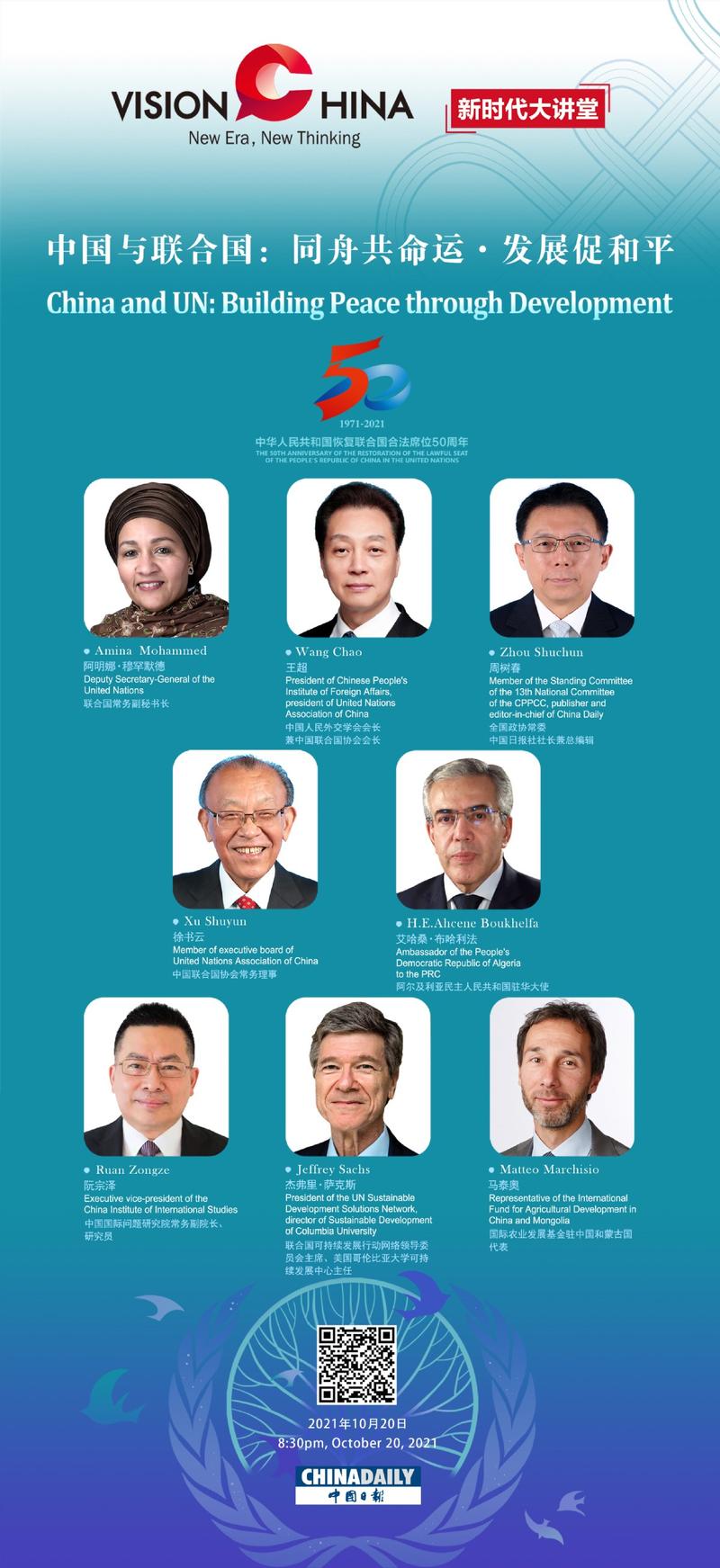
China is expected to play a critical role in working with the United Nations and the rest of the world to further shore up multilateralism and chart a path for growth in coming decades, said prominent officials and scholars from around the world.
They underlined the need to do so while addressing a Vision China session hosted by China Daily on Wednesday.
The event was held to mark the upcoming 50th anniversary, which will fall on Monday, of the restoration of China's lawful seat at the United Nations.
Through video speeches, the participants called the restoration an epoch-making event, and they summed up China's philosophy and recipe for promoting peace and common prosperity.
The Chinese solutions are helpful for overcoming problems threatening the world's economic and security outlooks, including the COVID-19 pandemic, they said.
To restore all rights to the People's Republic of China, the UN General Assembly adopted Resolution 2758 by an overwhelming majority on Oct 25, 1971.
Over the past 50 years, China has been a contributor to global development and has been actively promoting the settlement of disputes and conflicts through peaceful means.
Amina Mohammed, deputy secretary-general of the UN, said, "I would like to take this opportunity to commend China for its support to the United Nations throughout the past five decades.
"We appreciate not only China's steadfast financial support over the decades, which enables the entire UN system to support peace and development around the world-but its support of the landmark reforms we are undertaking to strengthen the UN development system for the future," Mohammed said.
Wang Chao, president of the United Nations Association of China and president of the Chinese People's Institute of Foreign Affairs, said that China has played an increasingly important role in UN affairs, along with other developing countries over the past 50 years, and has "become a natural leader in South-South cooperation by engaging in multifaceted development assistance".
"The world now stands at a new historical starting point. Looking forward, China will continue to be a true follower of multilateralism," he added.
Zhou Shuchun, a member of the Standing Committee of the 13th National Committee of the Chinese People's Political Consultative Conference and publisher and editor-in-chief of China Daily, said, "The past half-century has witnessed a profound change of China's status in the landscape of the world and, more importantly, testified to the country's unique contribution to the advancement of humanity.
"As a symbol of China being 'an anchor of stability' for the world today, the country sends the largest number of personnel of UN peacekeeping missions across the globe among the permanent members of the Security Council," he added.
Ahcene Boukhelfa, Algeria's ambassador to China, said that China "is the biggest actor defending the world from unipolarity, because of its negative effects such as wars, permanent conflicts and hostilities between states".
"China is a prominent contributor to many international organizations in various fields, and Chinese funding has contributed to the success of many programs run by UN organizations," he said, praising the competency of Chinese personnel and their roles in these agencies.
Economic push
At the general debate of the 76th Session of the UN General Assembly last month, President Xi Jinping proposed the Global Development Initiative to shore up teamwork for global growth amid the pandemic.
Echoing Xi's initiative, the speakers at the Vision China event highlighted a greater economic push for developing countries, sustained global growth and bolstering the influence of the UN, voicing their hopes about future China-UN collaboration.
Mohammed, the UN deputy secretary-general, said she expects China to "continue playing a pivotal role to reassert the value of multilateral collaboration so the United Nations is adequately equipped and ready to deliver on its mandates".
The UN "counts on China" to stand behind its work in promoting climate action, defending global peace and helping fully deliver on the promise of the UN's 2030 Agenda for Sustainable Development, she said.
Jeffrey Sachs, president of the UN Sustainable Development Solutions Network and director of Columbia University's Center for Sustainable Development, said, "We should take these 50 years as really a guidepost that we need another 50 years of strong cooperation and strong multilateralism."
As a military approach doesn't work for political, social or terrorist problems on the planet, countries "can solve cooperatively through economic investment" to tackle hunger, unemployment, economic weakness and poor infrastructure, Sachs said.
Ruan Zongze, executive vice-president of the China Institute of International Studies, defined China as a provider of public goods to the international community, and he referred to the Belt and Road Initiative as "the world's largest platform for international cooperation".
"It originates in China, but its benefits are shared by the world. For example, the China-Europe Railway Express has played an important role in fighting COVID-19 and revitalizing the economy," he said.
Matteo Marchisio, representative of the International Fund for Agricultural Development in China and Mongolia, said a great contribution of China to the world is showing that poverty reduction across the globe "is possible within our lifetime".
Since China has eliminated extreme poverty at home, the next "test bench" will be outside its borders, Marchisio said. Addressing global challenges and building global public goods "will be the area where China and the United Nations overlap and can work in the future", he added.
Xu Shuyun, a member of the executive board of the United Nations Association of China, said that the UN system's future reform should be made to "further improve priority setting and budget controlling and to forge greater synergy among multilateral development processes".
"We should encourage more young Chinese to join the UN system and to work for its noble cause," he said. "A few specialized UN agencies are now headed by Chinese. However, generally speaking, we still need more young Chinese to join in the UN system, not only at headquarters but also in the field across the world."



